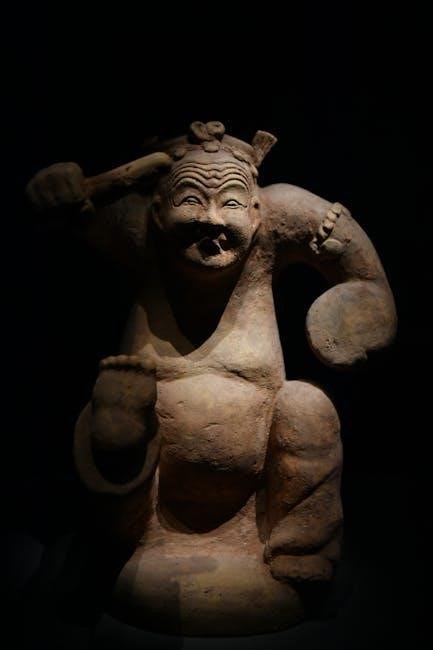Dr. Xin V. Li is an Assistant Professor at UT Southwestern Medical Center, specializing in gut microbiota and fungal interactions with the host immune system. His work focuses on understanding molecular mechanisms in health and disease, aiming to develop therapeutic strategies for infections, inflammatory disorders, and cancer.
1.1 Overview of Dr. Xin V. Li’s Expertise
Dr. Xin V. Li is a leading researcher in the field of microbiology and immunology, with a focus on gut microbiota and commensal fungi interactions. His expertise lies in understanding the molecular mechanisms by which these microorganisms influence host health and disease. Dr. Li employs advanced techniques in microbiology, immunology, and model organism studies to explore the intricate relationships between gut fungi and the immune system. His work has significant implications for developing therapeutic strategies to treat infections, autoimmune diseases, and cancer. By elucidating the role of commensal fungi in maintaining mucosal immunity and modulating inflammation, Dr. Li’s research opens new avenues for targeted interventions in inflammatory and immune-related disorders. His interdisciplinary approach bridges microbiology, immunology, and translational medicine.

Professional Background
Dr. Xin V. Li is an Assistant Professor at UT Southwestern Medical Center, with a secondary appointment in Immunology. He completed his postdoctoral training at Weill Cornell Medical College, where he studied commensal fungi and immune interactions. His professional journey includes expertise in microbiology, immunology, and technology transfer, with skills in technology evaluation, patenting, and licensing.
2.1 Academic Positions
Dr. Xin V. Li is an Assistant Professor (tenure-track) in the Department of Pediatrics at UT Southwestern Medical Center, with a secondary appointment in the Department of Immunology. He completed his postdoctoral training at Weill Cornell Medical College under the mentorship of Dr. Iliyan Iliev and Dr. David Artis, where he investigated the mechanisms underlying commensal fungi and their interactions with the host immune system. His academic journey reflects a strong commitment to advancing knowledge in microbiology and immunology. Dr. Li’s expertise spans both research and education, making him a valuable contributor to his institution. His roles have equipped him with a deep understanding of host-microbiota interactions, positioning him as a leader in his field.
2.2 Research Training and Experience
Dr. Xin V. Li’s research training began during his postdoctoral studies at Weill Cornell Medical College, where he worked under the guidance of Dr. Iliyan Iliev and Dr. David Artis. His research focused on understanding the mechanistic underpinnings of commensal fungi and their interactions with the host immune system, particularly in steady-state and inflammatory conditions. He has expertise in employing advanced techniques in microbiology and immunology, utilizing model organisms such as Drosophila and mouse models to study host-microbiota interactions. His research experience has equipped him with a deep understanding of fungal infections, mucosal immunology, and autoimmune diseases. Dr. Li’s work has laid the foundation for developing therapeutic strategies aimed at modulating microbiota for treating infections and inflammatory disorders. His research experience is integral to his current academic and investigative endeavors.

Research Interests
Dr. Xin V; Li’s research focuses on gut microbiota, commensal fungi, mucosal immunology, and autoimmune diseases, exploring their interactions and implications for advancing therapeutic strategies in health and disease.
3.1 Gut Microbiota and Host Interactions

Dr. Xin V. Li investigates the intricate relationships between gut microbiota, particularly commensal fungi, and the host immune system. His research employs advanced techniques, including multi-omic approaches and model organisms, to elucidate how microbial communities influence homeostasis and inflammation. By exploring the molecular mechanisms underlying these interactions, Dr. Li aims to uncover how dysregulation of gut microbiota contributes to various diseases. His work has implications for understanding how commensal fungi modulate immune responses, potentially leading to novel therapeutic strategies for infections, autoimmune disorders, and cancer. This research emphasizes the critical role of gut microbiota in maintaining immune balance and overall health, offering insights into targeted interventions to restore microbial harmony in disease states.
3.2 Role of Commensal Fungi
Dr. Xin V. Li’s research extensively explores the role of commensal fungi in shaping gut microbiota dynamics and their impact on host health. He investigates how these fungi interact with the immune system, modulating inflammation and maintaining mucosal barrier integrity. Through advanced techniques, including multi-omic analyses and model organisms, Dr. Li elucidates the mechanisms by which commensal fungi influence host immune responses. His work highlights the dual role of fungi in promoting homeostasis and contributing to disease when imbalanced. By understanding fungal-host interactions, Dr; Li aims to develop targeted therapies for infections, autoimmune disorders, and cancer. This research underscores the importance of commensal fungi in regulating immune function and maintaining microbial equilibrium, offering novel avenues for disease intervention and treatment.
3;3 Mucosal Immunology
Dr. Xin V. Li’s research delves into the intricate mechanisms of mucosal immunology, focusing on how the immune system interacts with mucosal surfaces to maintain barrier function and prevent infection. His work investigates the interplay between gut microbiota, commensal fungi, and the immune system, particularly in the context of inflammatory and autoimmune diseases. By employing cutting-edge techniques, Dr. Li identifies key pathways and molecules that regulate mucosal immune responses. His findings have implications for understanding how dysregulation of these interactions can lead to conditions such as inflammatory bowel disease and autoimmune disorders. This research also opens avenues for developing novel therapeutic strategies to restore mucosal immune homeostasis and treat associated diseases effectively. Dr. Li’s contributions in this field are pivotal for advancing our understanding of immune regulation at mucosal interfaces.
3.4 Autoimmune Diseases and Inflammation
Dr. Xin V. Li’s research explores the relationship between gut microbiota, particularly commensal fungi, and the development of autoimmune diseases and inflammation. His work investigates how imbalances in microbial communities, known as dysbiosis, can trigger or exacerbate conditions such as autoimmune disorders. By studying the molecular mechanisms underlying these interactions, Dr. Li aims to identify potential therapeutic targets for modulating the immune response. His findings have significant implications for understanding the role of the microbiome in autoimmune diseases and for developing novel treatments to reduce inflammation and restore immune balance. This research is crucial for advancing our knowledge of how microbial interactions influence autoimmune conditions and for designing interventions that target the root causes of these diseases.
Key Findings
Dr. Xin V. Li’s research has uncovered critical molecular mechanisms linking gut microbiota, particularly fungi, to host immune interactions, shedding light on inflammation and disease pathways.
4.1 Molecular Mechanisms in Gut-Brain Axis
Dr. Xin V; Li’s research has elucidated the intricate molecular mechanisms underlying the gut-brain axis, focusing on how gut microbiota, particularly commensal fungi, influence neural function and behavior. His studies reveal that bidirectional communication between the gut and brain is mediated by microbial metabolites, neurotransmitters, and immune molecules. These interactions regulate emotional states, cognitive processes, and neuroinflammation. Dr. Li has identified specific signaling pathways, such as the vagus nerve and gut-derived hormones, that facilitate this cross-talk. His work also highlights how dysregulation of these mechanisms may contribute to neurological disorders, including anxiety, depression, and neurodegenerative diseases. By deciphering these pathways, Dr. Li aims to develop targeted therapies to modulate gut-brain interactions for improved mental and neurological health outcomes.
4.2 Therapeutic Strategies Development
Dr. Xin V. Li has pioneered innovative therapeutic strategies targeting gut microbiota and commensal fungi to treat infections, inflammatory disorders, and cancer. His research emphasizes modulating microbial communities to restore immune homeostasis. By identifying key fungal species and their interactions with the host, he has developed novel probiotics and prebiotics to enhance gut health. Additionally, Dr. Li’s work explores small-molecule inhibitors and immunomodulatory drugs to regulate excessive inflammation. These approaches aim to prevent disease progression and improve treatment outcomes. His therapeutic strategies are tailored to address specific pathological conditions, offering personalized medicine solutions. This groundbreaking work has the potential to revolutionize treatments for autoimmune diseases, cancers, and infectious disorders by leveraging the gut microbiome’s therapeutic potential.
4.3 Model Organisms Used in Research
Dr. Xin V. Li employs diverse model organisms to study gut microbiota and fungal interactions with the host immune system. Bacteria, fungi, and Drosophila melanogaster are key models, enabling detailed exploration of microbial dynamics and immune responses. These organisms provide genetic tractability and physiological relevance, allowing Dr. Li to dissect molecular mechanisms underlying gut-host interactions. For instance, Drosophila serves as an excellent system to study innate immunity and gut microbiota influence on inflammation. Similarly, bacterial and fungal models help elucidate commensal relationships and their impact on disease states. By leveraging these organisms, Dr. Li’s research bridges basic science and translational applications, offering insights into therapeutic interventions for infections and inflammatory disorders. This approach ensures a comprehensive understanding of microbiota-host interactions at multiple biological levels.

Implications of His Work
Dr. Xin V. Li’s research has profound implications for treating infections, inflammatory disorders, and cancer by targeting gut microbiota and commensal fungi interactions.

5.1 Applications in Treating Infections
Dr. Xin V. Li’s research on gut microbiota and commensal fungi has significant applications in treating infections. His work elucidates how specific fungal species interact with the host immune system, potentially leading to novel therapeutic strategies. By understanding these interactions, Dr. Li aims to develop targeted interventions to modulate microbial communities, reducing infection severity. His findings could pave the way for personalized treatments, addressing both bacterial and fungal infections. Additionally, his research highlights the role of mucosal immunology in infection control, offering new avenues for preventing invasive fungal diseases. This work could revolutionize infection management, particularly in immunocompromised patients, by leveraging the gut-brain axis and microbial balance. The implications extend to developing antimicrobial therapies that are more precise and less disruptive to beneficial microbes.
5.2 Impact on Inflammatory Disorders
Dr. Xin V. Li’s research has shed light on the intricate relationship between gut microbiota, particularly commensal fungi, and inflammatory disorders. His findings reveal how these microbial interactions influence immune homeostasis and inflammation. By elucidating the molecular mechanisms underlying these processes, Dr. Li’s work opens new avenues for treating conditions like inflammatory bowel disease (IBD) and autoimmune disorders. His studies suggest that modulating the gut mycobiota could reduce inflammation and restore balance to the immune system. This research has significant implications for developing targeted therapies, such as probiotics or immunomodulators, to mitigate inflammatory responses. Additionally, his work on the gut-brain axis highlights the potential for systemic approaches to manage inflammation, offering hope for patients with chronic inflammatory conditions.
5.3 Contributions to Cancer Research
Dr. Xin V. Li’s research has significantly advanced our understanding of the role of gut microbiota in cancer progression and immune modulation. His work has shown that commensal fungi and bacteria in the gut can influence tumor microenvironments, impacting cancer growth and metastasis. By identifying specific microbial interactions, Dr. Li’s studies have opened new avenues for cancer therapy, particularly in targeting the gut-brain axis; His findings suggest that modulating the gut microbiome could enhance immune checkpoint inhibitor responses, offering promising strategies for treating cancers such as colorectal and liver cancer. Additionally, his research on fungal infections and mucosal immunology has implications for reducing cancer-related complications. Overall, Dr. Li’s contributions are paving the way for innovative, microbiome-based therapies in oncology. His work continues to inspire further exploration into the interconnectedness of microbiota and cancer biology.
Publications and Citations
Dr. Xin V. Li’s publications have been cited over 1980 times, highlighting his impactful research on fungal infections, microbiota, and mucosal immunology in various scientific journals.
6.1 Notable Publications
Dr. Xin V. Li has authored several groundbreaking studies on gut microbiota and fungal interactions. His work, published in high-impact journals, explores the gut-brain axis and immune system modulation. A notable publication investigates commensal fungi’s role in maintaining gut homeostasis and their impact on inflammatory diseases. Another significant study highlights the molecular mechanisms underlying fungal-host interactions, offering insights into potential therapeutic strategies. His research has been widely cited, reflecting its importance in advancing microbiology and immunology. Collaborations with leading experts like Iliyan Iliev and David Artis further underscore the quality of his work. Dr. Li’s publications are frequently referenced in scientific communities, contributing significantly to the understanding of microbiota’s role in health and disease.
6.2 Citation Impact
Dr. Xin V. Li’s research has had a significant citation impact, with his work being widely referenced in scientific literature. His studies on gut microbiota, fungal interactions, and mucosal immunology have garnered over 1,980 citations, reflecting their influence in the field. His publications in high-impact journals have contributed to advancing understanding of host-microbiota dynamics and therapeutic strategies for inflammatory and infectious diseases. The high citation rate underscores the relevance of his findings to both basic and translational research. His work is frequently cited in studies exploring microbiome-related mechanisms and interventions, demonstrating its enduring impact on the scientific community. This citation impact highlights Dr. Li’s role as a leading researcher in microbiology and immunology.
Collaborations and Affiliations
Dr; Xin V. Li collaborates with Iliyan Iliev and David Artis at Weill Cornell. He is affiliated with UT Southwestern Medical Center, contributing to microbiota research.
7.1 Professional Collaborations
Dr. Xin V. Li collaborates with prominent researchers like Iliyan Iliev and David Artis, focusing on gut microbiota and immune system interactions. His work at Weill Cornell and UT Southwestern highlights interdisciplinary efforts, blending microbiology and immunology to advance therapeutic strategies. These collaborations have led to significant discoveries in understanding how commensal fungi influence inflammation and homeostasis. By working with experts in the field, Dr. Li aims to translate basic science into clinical applications, addressing infections, autoimmune diseases, and cancer. His partnerships underscore the importance of teamwork in addressing complex biomedical challenges, fostering innovation and knowledge exchange.

7.2 Institutional Affiliations
Dr. Xin V. Li is currently an Assistant Professor at the University of Texas Southwestern Medical Center, where he holds a primary appointment in the Department of Pediatrics and a secondary appointment in the Department of Immunology. His academic affiliations reflect his commitment to advancing research in microbiota and immunology. Additionally, he has been associated with Weill Cornell Medical College as a postdoctoral researcher, contributing to studies on commensal fungi and their role in immune system interactions.
These institutional affiliations provide Dr. Li with a robust framework to explore gut microbiota and fungal infections, leveraging cutting-edge facilities and collaborative environments; His work at these institutions underscores his dedication to understanding host-microbiota dynamics and developing innovative therapeutic approaches.

Awards and Recognition
Dr. Xin V. Li has received recognition for his contributions to microbiota research and immunology, though specific awards details are not publicly highlighted in available sources.
8.1 Received Awards
Dr. Xin V. Li has earned recognition for his groundbreaking research in microbiota and immunology. While specific awards are not detailed in available sources, his work has garnered significant academic and professional acclaim. His contributions to understanding gut microbiota and fungal interactions have positioned him as a leading figure in his field. The impact of his research on therapeutic developments suggests potential for future accolades. His dedication to advancing medical science continues to inspire colleagues and students alike, solidifying his reputation as a pioneering researcher.
8.2 Professional Recognition
Dr. Xin V. Li’s contributions to microbiota research have been recognized through prestigious awards that highlight his innovative approaches in the field.
Future Directions
Dr. Xin V. Li’s future research aims to expand understanding of microbiota interactions and explore new therapeutic strategies for inflammatory and infectious diseases, focusing on innovative approaches to improve human health.
9.1 Upcoming Research Projects
Dr. Xin V. Li is planning to expand his research into the intricate relationships between gut microbiota and host immune responses, with a particular emphasis on commensal fungi. His upcoming projects aim to explore novel therapeutic strategies for treating autoimmune diseases and cancer by targeting specific fungal interactions. Additionally, he intends to investigate the role of the gut-brain axis in inflammatory disorders, potentially uncovering new pathways for intervention. Collaborations with other leading researchers in microbiology and immunology are expected to enhance the scope and impact of these studies. Dr. Li’s future work will also focus on developing innovative model organisms to better understand disease mechanisms and test potential treatments. These projects promise to advance our understanding of microbiota-host interactions and pave the way for groundbreaking therapies.

9.2 Goals and Aspirations

Dr. Xin V. Li aspires to pioneer groundbreaking research in microbiota-host interactions, aiming to revolutionize the understanding of fungal and bacterial roles in health and disease. His long-term goal is to develop innovative therapeutic strategies for treating autoimmune diseases, inflammatory disorders, and cancer by targeting specific microbial interactions. He also hopes to establish himself as a leading expert in mucosal immunology and gut microbiota research. Dr. Li is committed to mentoring the next generation of scientists and fostering interdisciplinary collaborations to address complex medical challenges. Additionally, he aims to bridge the gap between basic research and clinical applications, ensuring his findings translate into real-world benefits for patients. His ultimate aspiration is to make a significant impact on global health through his work.
Dr. Xin V. Li’s work has significantly advanced our understanding of gut microbiota and fungal interactions with the host immune system. His research has opened new avenues for developing therapeutic strategies to address infections, inflammatory disorders, and cancer. By bridging basic science with clinical applications, Dr. Li aims to translate his findings into real-world benefits for patients. His dedication to mentoring future scientists and fostering interdisciplinary collaborations underscores his commitment to advancing medical research. As a leading expert in mucosal immunology, Dr. Li continues to aspire to revolutionary discoveries that impact global health. His work serves as a testament to the power of innovative research in transforming our understanding of complex biological systems.